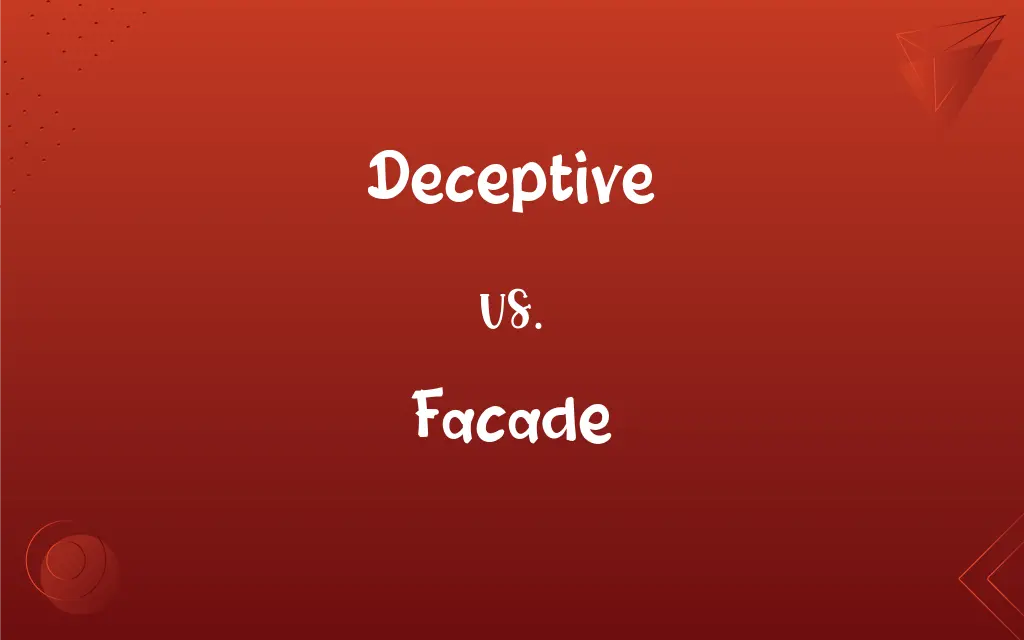Deceptive vs. Facade: What's the Difference?
Edited by Janet White || By Harlon Moss || Updated on November 9, 2023
"Deceptive" means giving an appearance or impression different from the true one; "facade" is a superficial appearance or illusion of something.

Key Differences
"Deceptive" describes an act or instance where appearances are misleading, suggesting something is different from the truth. A "facade," however, often refers to a physical front of a building, or metaphorically, to a superficial front put up to hide one's true feelings or situation. While deceptive actions can be intentional or unintentional, a facade is typically a deliberate front or illusion.
Deception involves misleading others through false appearances or statements. A facade, in its figurative sense, is related to deception in that it's a false outward appearance that is maintained to conceal a less pleasant reality. A deceptive person might hide their intentions behind a facade of friendliness.
A deceptive advertisement might promise benefits that it doesn't deliver, creating a facade of value. Similarly, someone may put up a cheerful facade to hide their sadness. Deceptive implies trickery or dishonesty, whereas a facade might simply be a means of self-protection or privacy.
In the context of deception, the angle is often about manipulating perceptions or facts. In contrast, a facade is like the set on a stage; it’s not about the manipulation of facts but creating a specific, usually more appealing, perception. Deception actively misleads, while a facade might just passively disguise.
Deceptive strategies are employed in games of strategy, where the goal is to mislead opponents about one's true position or intentions. On the other hand, a facade could be the calm demeanor of a poker player, a mask worn to prevent others from gauging their thoughts or feelings.
ADVERTISEMENT
Comparison Chart
Definition
Intention to mislead or give a false impression
A superficial appearance or front
Usage
Describes actions, statements, intentions
Describes physical fronts or emotional fronts
Purpose
To conceal the truth or misdirect
To hide, protect, or enhance something
Connotation
Often negative, implying dishonesty
Can be neutral, as in architecture
Example
A deceptive trick
The facade of a building
ADVERTISEMENT
Deceptive and Facade Definitions
Deceptive
Intentionally misleading.
The con artist's offer was deceptive.
Facade
The front of a building.
The facade of the old house was in need of repair.
Deceptive
Appearances that are misleading.
His strength is deceptive, considering his age.
Facade
A superficial or false front.
She maintained a facade of bravery throughout the trial.
Deceptive
Not honest or candid.
Her deceptive reply concealed her real motive.
Facade
The face of anything, especially when regarded as superficial or false.
Under the facade of wealth was a struggling economy.
Deceptive
Designed to deceive.
The email looked legitimate but was actually deceptive.
Facade
A way of behaving that hides one's true feelings.
Despite the argument, they put up a united facade in public.
Deceptive
Giving an illusion of something that is not true.
The calm sea was deceptive; a storm was coming.
Facade
A deceptive outward appearance.
His smile was just a facade to hide his insecurity.
Deceptive
Deceiving or tending to deceive
A deceptive advertisement.
Facade
The face of a building, especially the principal face.
Deceptive
Likely or attempting to deceive.
Deceptive practices
Appearances can be deceptive.
Facade
An artificial or deceptive front
Ideological slogans that were a façade for power struggles.
Deceptive
Tending to deceive; having power to mislead, or impress with false opinions; as, a deceptive countenance or appearance.
Language altogether deceptive, and hiding the deeper reality from our eyes.
Facade
(architecture) The face of a building, especially the front view or elevation.
Deceptive
Causing one to believe what is not true or fail to believe what is true;
Deceptive calm
A delusory pleasure
Facade
(by extension) The face or front (most visible side) of any other thing, such as an organ.
Deceptive
Tending to deceive or mislead either deliberately or inadvertently;
The deceptive calm in the eye of the storm
Deliberately deceptive packaging
A misleading similarity
Statistics can be presented in ways that are misleading
Facade
(figuratively) A deceptive or insincere outward appearance.
Facade
(programming) An object serving as a simplified interface to a larger body of code, as in the facade pattern.
Facade
The front of a building; esp., the principal front, having some architectural pretensions. Thus a church is said to have its façade unfinished, though the interior may be in use.
Facade
The face or front of a building
Facade
A showy misrepresentation intended to conceal something unpleasant
FAQs
Can a facade be unintentional?
Architecturally, no. Emotionally, it's possible if someone is not aware of the front they are putting up.
Is deception always deliberate?
Deception is generally intentional, but someone can be unintentionally deceptive due to misinformation.
Can businesses be deceptive?
Yes, businesses can engage in deceptive practices, which is often regulated by law.
Is maintaining a facade exhausting?
It can be, especially if it's a significant departure from one's true feelings or situation.
Can a facade be positive?
Yes, architecturally it can be aesthetic, and emotionally it can protect privacy.
Are all deceptions harmful?
Many deceptions can lead to harm, but some may be benign, like a magician's trick.
Is a facade necessary in architecture?
Yes, every building has a facade as part of its exterior design.
How can a facade be recognized?
A facade can sometimes be recognized by inconsistencies between one’s words and actions.
Can a product be deceptive?
Yes, if it is marketed to appear as something it's not, it's deceptive.
Can a facade exist without deception?
Yes, in architecture a facade is just the front of a building with no intent to deceive.
Is being deceptive illegal?
It can be, especially in cases of fraud or when it leads to harm.
Does deceptive always involve lying?
Not always; it can also involve half-truths, misleading implications, or omissions.
Can a facade be a good thing?
It can be, such as when it's used to preserve someone's feelings or to maintain social harmony.
What is the purpose of a facade in literature?
In literature, a facade can symbolize hidden truths and is often used to create depth in characters.
Are deceptive people always aware of their deceit?
Not necessarily; some may have convinced themselves that their false narrative is true.
Is it ethical to use facades in marketing?
It depends on the intent and outcome; a facade that misleads consumers is generally considered unethical.
Can one be deceptive without speaking?
Yes, deception can occur through body language, actions, or by withholding information.
Can societies have facades?
Yes, societies can maintain facades in the form of cultural norms that may mask underlying issues.
How do you deal with deceptive people?
It's important to set clear boundaries, confront them with evidence, and possibly limit interaction.
Is it possible to be accidentally deceptive?
Yes, if one unknowingly presents false information as truth, it is accidental deception.
About Author
Written by
Harlon MossHarlon is a seasoned quality moderator and accomplished content writer for Difference Wiki. An alumnus of the prestigious University of California, he earned his degree in Computer Science. Leveraging his academic background, Harlon brings a meticulous and informed perspective to his work, ensuring content accuracy and excellence.
Edited by
Janet WhiteJanet White has been an esteemed writer and blogger for Difference Wiki. Holding a Master's degree in Science and Medical Journalism from the prestigious Boston University, she has consistently demonstrated her expertise and passion for her field. When she's not immersed in her work, Janet relishes her time exercising, delving into a good book, and cherishing moments with friends and family.







































































